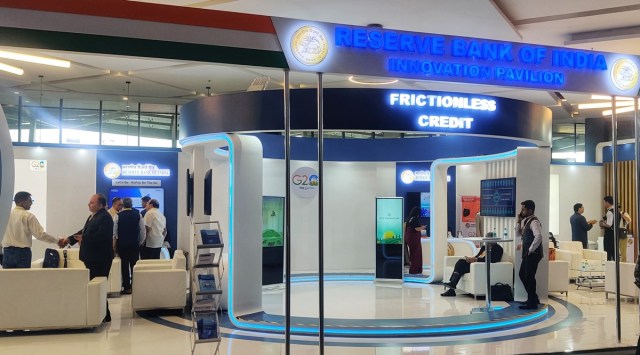India is set to expand its presence for cross-border bill payments in the UK through the Bharat Bill Payment System (BBPS) after having operationalised it in four countries in the Middle East earlier. With this, non-resident Indians there would be able to make use of the system for direct payments towards bill payments through multiple modes such as Unified Payments Interface or UPI, National Electronic Funds Transfer or NEFT, wallets, debit and credit cards.
“Our initial focus was on the Middle East countries because of the sizeable NRI population there. It (Bharat Bill Payment System) is already operational in Oman, Kuwait, UAE and Bahrain. Now, it is about to go live in the UK for cross-border bill payments. Later, we could explore other countries with a significant NRI presence such as Canada and Singapore,” Noopur Chaturvedi, Chief Executive Officer, NPCI Bharat BillPay Ltd said.

Speaking at the Reserve Bank of India’s Innovation Pavilion at the ongoing G20 Leaders’ Summit, Chaturvedi also said they are receiving many requests from the NRIs to expand this facility in their respective countries.
The Bharat Bill Payment System is a RBI conceptualised system driven by National Payments Corporation of India (NPCI). It acts as a one-stop ecosystem for payment of all bills with an interoperable and accessible. “Anytime Anywhere” Bill payment service. A variety of bills including electricity, water, gas, telephone, DTH, and insurance can be paid through the system.
 Foreign delegates trying out the facilities at the digital kiosks. (Express Photo)
Foreign delegates trying out the facilities at the digital kiosks. (Express Photo)
India is giving a glimpse of its digital payments architecture through Unified Payments Interface (UPI) and e-rupee or central bank digital currency to the delegates here at Delhi during the ongoing G20 Leaders’ Summit. About 20-21 UPI transactions have happened so far on the first day of the G20 Leaders’ Summit at the pavilion stalls of the RBI. Delegates from countries including Germany, China, Nigeria, Brazil, Russia, UAE, Argentina, Thailand, United Nations Secretariat and Chief Economic Adviser to the UK Prime Minister undertook the UPI transactions, officials said.
The use of UPI service for foreign delegates without the need for a bank account, RuPay payments that can be made through accessories such as smartwatches, India’s digital rupee, and a database platform that can be used to lend money for various purposes — these are the key parts of India’s digital public infrastructure efforts that is on show for foreign delegates during the G20 Summit.
The Indian Express had earlier reported that throughout India’s presidency of the G20, it has played up the country’s efforts at creating digital public infrastructure and has also explored other nations’ interest to adopt the underlying technologies that power India’s digital public infrastructure (DPI) push, which it brands as the India Stack.
Story continues below this ad
Industry analysts see this as India’s bid to set itself up as a nation pioneering digital governance, especially as it aspires to assume a leadership role in the Global South. Within government circles, this is also being pegged as a differentiator from rival China, which is funding physical infrastructure development in other developing countries.
“DPIs, for the first time ever, reached a global consensus and what ought to be their definition, framework, and principles… India is now a case study, as a nation that employed and deployed technological tools for progress and growth. Countries that have lagged behind increasingly see this as a way to follow India’s lead in DPIs, an open-source digital infrastructure… Through these G20 conversations, we have further understood how DPIs are a powerful mechanism for inclusion, especially for countries in the Global South,” Minister of State for Electronics and IT Rajeev Chandrasekhar said at a press briefing Wednesday.
 The Bharat Bill Payment System is a RBI conceptualised system driven by National Payments Corporation of India (NPCI). (Express Photo)
The Bharat Bill Payment System is a RBI conceptualised system driven by National Payments Corporation of India (NPCI). (Express Photo)
At the RBI’s pavilion at the G20 Summit venue, an experience centre is available for delegates having an interactive demonstration of RBI’s Public Tech Platform (PTP) for frictionless credit.
The platform serves as a single window for accessing citizens’ information held by multiple government departments and ministries. Lenders can connect to the platform to source such data or information required for making credit assessment and decision in a seamless manner. The RBI had launched a pilot of the platform in August and is first focusing on products such as Kisan Credit Card, dairy loans, collateral-free loans for MSMEs, personal loans and home loans.
Story continues below this ad
Foreign delegates are also able to experience the UPI platform, which has been among the prominent pitches that India has made to the world, including both developing and developed countries. The facility is being provided to G20 guests without them needing to have a bank account in India, making use of Prepaid Payment Instruments (PPI) wallets linked to UPI for making payments at merchant outlets. When the foreign nationals are leaving India they can either convert the balance in the prepaid wallet back as foreign currency or decide to hold the balance in the wallet for use in the next trip if they frequently visit India, officials said.
This assumes significance given that India is actively marking other countries to adopt the UPI architecture. The service is being accepted in international markets such as France, UAE, Singapore and Sri Lanka, with countries like Japan having shown an interest in adopting the payments system.
A live transaction of the digital rupee, also called the Central Bank Digital Currency (CBDC) is also being shown to the delegates. The number of transactions using CBDC peaked in July, which saw around 25,000 transactions, but the number for August was lower given that banks were focusing on making CBDC interoperable with UPI, officials said.



 Foreign delegates trying out the facilities at the digital kiosks. (Express Photo)
Foreign delegates trying out the facilities at the digital kiosks. (Express Photo) The Bharat Bill Payment System is a RBI conceptualised system driven by National Payments Corporation of India (NPCI). (Express Photo)
The Bharat Bill Payment System is a RBI conceptualised system driven by National Payments Corporation of India (NPCI). (Express Photo)





























